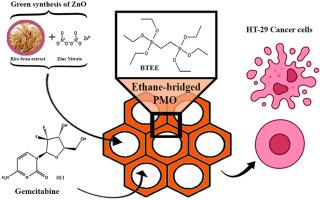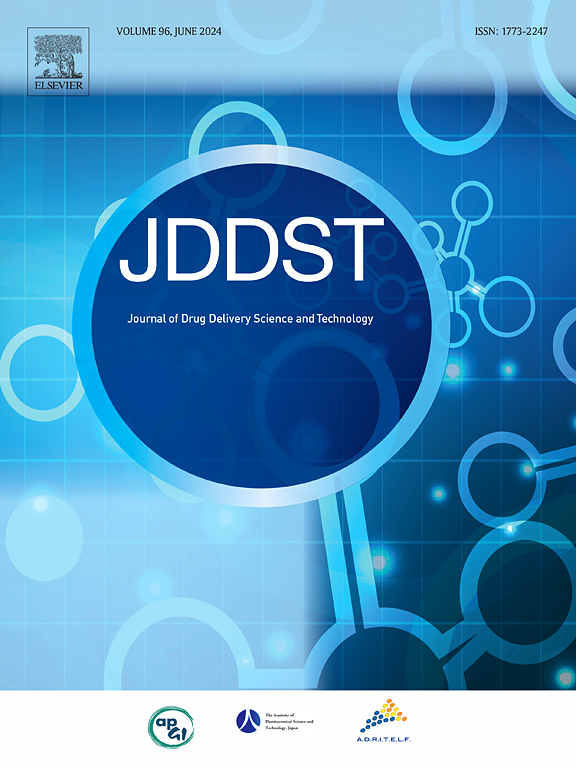Rice bran extract-assisted synthesis of PMO/ZnO nanocomposites for enhanced gemcitabine loading and anticancer efficacy
IF 4.9
3区 医学
Q1 PHARMACOLOGY & PHARMACY
Journal of Drug Delivery Science and Technology
Pub Date : 2025-09-10
DOI:10.1016/j.jddst.2025.107515
引用次数: 0
Abstract
This study investigates the green synthesis and detailed characterization of PMO/ZnO nanocomposites, using rice bran extract as a sustainable reducing agent to produce ZnO nanoparticles in-situ on periodic mesoporous organosilica (PMO). TEM analysis confirmed the uniform distribution of spherical ZnO nanoparticles, approximately 100 nm in size, within the PMO framework. BET measurements showed a significant decrease in surface area from 1087 m2/g to 498 m2/g after ZnO loading, along with a reduction in pore volume following the encapsulation of gemcitabine. This indicates efficient drug loading, with an efficiency of 49.7 %–54.7 %. Drug release experiments showed pH-responsive behavior, with faster release at acidic conditions (pH 5.6), similar to the tumor microenvironment. MTT cytotoxicity tests on HT-29 colon cancer cells, known for their sensitivity to gemcitabine, displayed enhanced antiproliferative effects with the drug-loaded nanocomposites compared to the free drug. These results underscore the potential of this green-synthesized nanocomposite system as a multifunctional platform, combining biocompatibility, targeted drug delivery, and environmental sustainability, thereby advancing prospects for effective cancer treatments.

米糠提取物辅助合成PMO/ZnO纳米复合材料增强吉西他滨负载和抗癌效果
本研究以米糠提取物为可持续还原剂,在周期性介孔有机二氧化硅(PMO)上原位制备ZnO纳米颗粒,研究了PMO/ZnO纳米复合材料的绿色合成和详细表征。TEM分析证实了ZnO纳米颗粒在PMO框架内均匀分布,尺寸约为100 nm。BET测量显示,ZnO负载后,表面面积从1087 m2/g显著减少到498 m2/g,同时吉西他滨包封后孔隙体积也有所减少。表明载药效率为49.7% ~ 54.7%。药物释放实验显示pH响应行为,在酸性条件下(pH 5.6)释放更快,与肿瘤微环境相似。以对吉西他滨敏感而闻名的HT-29结肠癌细胞的MTT细胞毒性测试显示,与游离药物相比,负载药物的纳米复合材料具有增强的抗增殖作用。这些结果强调了绿色合成纳米复合材料系统作为多功能平台的潜力,结合了生物相容性、靶向药物传递和环境可持续性,从而推进了有效癌症治疗的前景。
本文章由计算机程序翻译,如有差异,请以英文原文为准。
求助全文
约1分钟内获得全文
求助全文
来源期刊
CiteScore
8.00
自引率
8.00%
发文量
879
审稿时长
94 days
期刊介绍:
The Journal of Drug Delivery Science and Technology is an international journal devoted to drug delivery and pharmaceutical technology. The journal covers all innovative aspects of all pharmaceutical dosage forms and the most advanced research on controlled release, bioavailability and drug absorption, nanomedicines, gene delivery, tissue engineering, etc. Hot topics, related to manufacturing processes and quality control, are also welcomed.

 求助内容:
求助内容: 应助结果提醒方式:
应助结果提醒方式:


